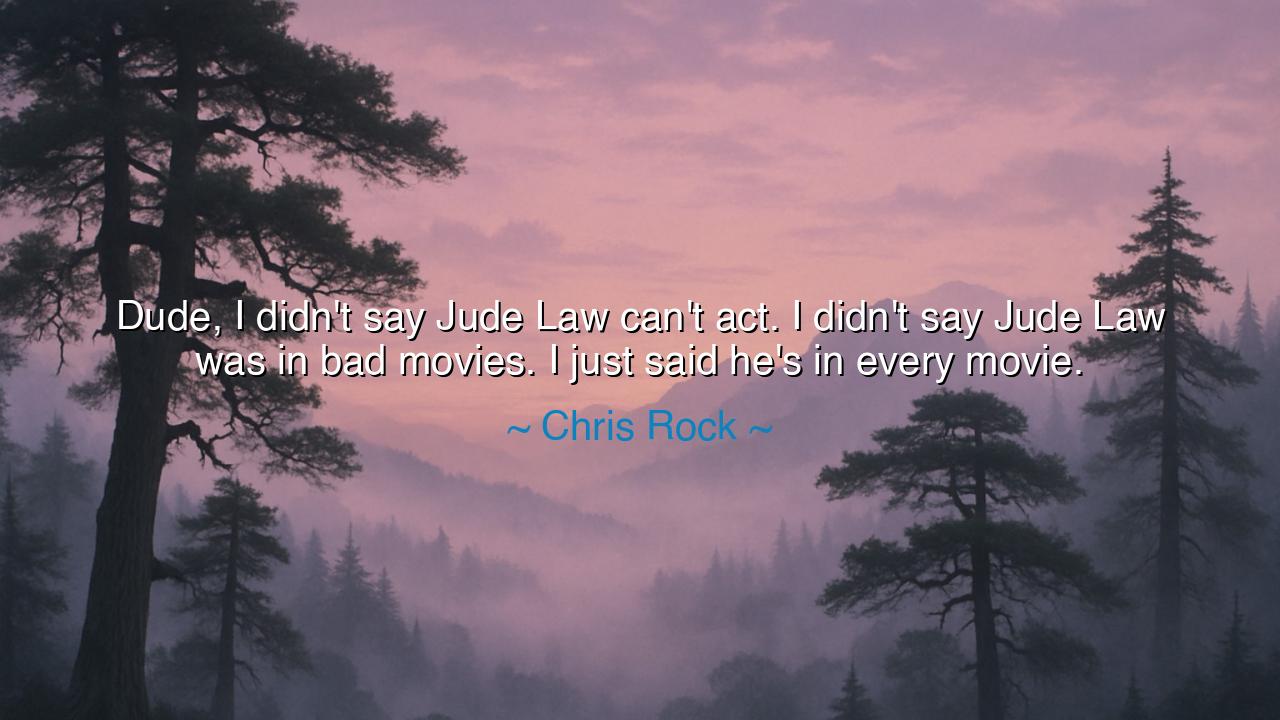
Dude, I didn't say Jude Law can't act. I didn't say Jude Law was
Dude, I didn't say Jude Law can't act. I didn't say Jude Law was in bad movies. I just said he's in every movie.






Listen closely, O seekers of wisdom, for the words of Chris Rock carry both humor and insight: “Dude, I didn’t say Jude Law can’t act. I didn’t say Jude Law was in bad movies. I just said he’s in every movie.” At first glance, these words seem playful, perhaps even dismissive. Yet, beneath the humor lies a profound observation about the nature of repetition and visibility in the world of entertainment, and, by extension, in life itself. Rock’s comment speaks to the reality of living in a world where certain individuals, through sheer prolific output, become ubiquitous, their presence so widespread that it risks losing its impact.
In the ancient world, the great heroes and leaders were not made great by being in everything, but by the specificity of their deeds, the focus of their actions, and the depth of their contributions. Alexander the Great, though a man of incredible ambition and might, did not conquer every land in sight. He focused his energies on the regions that would shape his legacy. His greatness lay not in quantity but in quality—in the moments when his leadership was decisive, and when his deeds were unparalleled in their scope and significance. So too, in Chris Rock’s observation, we see that to be truly impactful, one must select carefully where to pour one’s efforts, rather than spreading oneself too thin, as Jude Law—the actor of many films—has done.
Think, O wise ones, of the great Socrates, who, though not widely revered in his own time, left a legacy that would resonate for centuries. His philosophy was not expressed in every moment, but in those few, significant dialogues that challenged the very foundations of human thought. Socrates did not need to be in every philosophical discourse—he simply needed to speak the words that would change the course of history. Chris Rock’s critique of Jude Law’s overabundance in films reminds us that excess—no matter how talented the individual—can sometimes diminish the value of the work itself. Like Socrates, one must choose the moments that will resonate, rather than filling every space without true purpose.
Let us reflect on the example of Shakespeare, whose plays were not written to appease the tastes of all, but to speak to the human condition in deep and specific ways. Shakespeare’s works—though performed countless times—do not lose their significance because they are so prevalent; they stand out because they capture universal truths in ways that few others can. In contrast, those who are too frequently present in every project may find their contributions losing the uniqueness that initially captured the audience’s attention. Rock’s words invite us to consider how we, too, might fall into the trap of overextension, diluting our impact by spreading ourselves too thin.
Consider also the story of Michelangelo, whose genius was not defined by the number of sculptures he produced, but by the mastery he displayed in each. His David and the Pietà are not only works of incredible artistic skill, but expressions of human emotion that transcend the medium. Michelangelo understood that in order to leave a lasting legacy, one must focus and concentrate their efforts. His refusal to be everywhere at once, to overexpose himself, allowed his work to retain its power and uniqueness. Chris Rock’s critique of Jude Law serves as a reminder to focus not on being everywhere, but on making our efforts count in the few places where they truly matter.
The lesson here, O future generations, is clear: true greatness is not found in the quantity of one’s output, but in the quality of it. Rock’s observation about Jude Law serves as a cautionary tale for those who wish to achieve true mastery in their field. One can be talented, even prolific, but the true mark of an artist or leader lies in the power of their focused contributions, in the careful selection of where and how they pour their energy. Do not seek to be everywhere at once, for in spreading yourself too thin, you risk losing the impact and resonance of your work.
Therefore, O wise ones, learn to focus your energy and time. Like Socrates, Michelangelo, and Shakespeare, who did not flood the world with their creations, but instead chose their moments of brilliance, so too must you be deliberate in where you place your efforts. Choose wisely the spaces you wish to occupy, the causes you wish to champion, and the projects you wish to engage in. For true impact is found not in being everywhere, but in being purposeful and intentional with every step you take.






AAdministratorAdministrator
Welcome, honored guests. Please leave a comment, we will respond soon